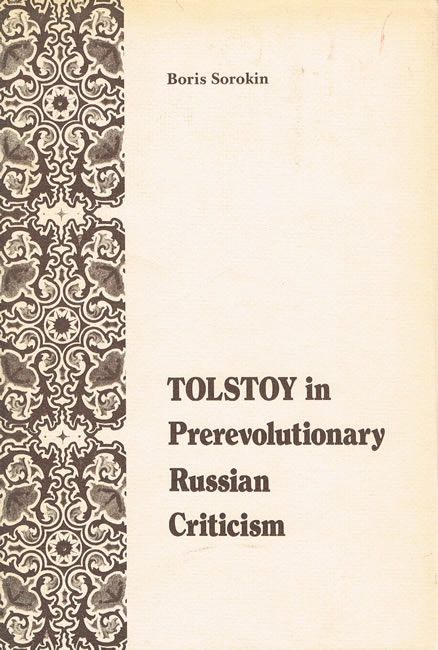Tolstoy in Prerevolutionary Russian CriticismBoris Sorokin |
 1979 Literary Criticism / Russian & Former Soviet Union 328 pp. 6x9 |
|||
|
read the full text of the book •
|
Leo Tolstoy has been described as the most momentous phenomenon of Russian life in the nineteenth century. And, indeed, both in his lifetime and for about a generation afterward, he remained a figure of extraordinary power and authority whose towering personality, especially during the last part of his life, was to dominate to an unprecedented degree the intellectual climate of both Russia and the world. Even today, the seminal force of his ideas on literature, morals, politics, and life in general continues to exert a major influence on art and philosophy. Not surprisingly, an interest of this intensity and of such duration has produced an immense body of critical writing on Tolstoy, his ideas, and his work—a literature so vast that surveys establishing its essential substance and true dimensions are sorely needed if we are ever to comprehend it. Soviet scholars have successfully catalogued the books and articles that belong to the postrevolutionary peiod; but only sporadic attempts have been made to accord equally comprehensive and analytical treatment to works of the prerevolutionary period, and the results have been disappointing—a few bibliographical surveys that are both incomplete and unreliable, a small number of collections of critical essays, some isolate short sections in textbooks, and a handful of studies devoted to individual critics and literary periodicals. Professor Sorokin has undertaken a systematic and comprehensive review of this neglected literature. He prefaces his magisterial study with an analysis of the historical and cultural conflicts at work in the years covered, and so establishes the intellectual milieu in which the critical writings he treats are to be interpreted and understood. He then moves on to an examination of what were the major tends in prerevoluationary criticism as these became identified with the divergent philosophies of six distinct groups of critics: (1) the early radicals of the 1850s and 60s, who, describing themselves as pragmatic rationalists, expected literature to prosecute measures of social reform designed to lead Russia out of her national backwardness; (2) the Slavophile or so-called organic critics, who were persuaded that literature should serve the cause of the Russian people through promultation at home and abroad of the mystical nature of the Russian nation; (3) the aesthetes—the writers, poets, and critics who believed that art was to be enjoyed as a value in and of itself, and that it was the obligation of literature to raise the general cultural level of the Russian population; (4) the narodniki, who insisted that literature promote and defend the rights of the individual; (5) the symbolists and impressionists, who saw art as the vehicle for expressing the ego of the artists and who advocated a literature rich in verbal symbols of the inexpressible; and (6) the Marxists, who viewed art as the efficient means of fostering their particular ideas. Dr. Sorokin examines critiques of Tolstoy’s works by ten prominent critics representing these dominant intellectual positions—Chernyshevsky, Pisarev, Grigor’ev, Strakhov, Dostoevsky, Turgenev, Mikhailovsky, Merezhkovsky, Plekhanov, and Lenin— and renders the reviews themselves in fresh English translations. He is led to conclude that Tolstoy’s critics lacked the very faculty they attributed to him: the prescience to discern the lines of future social and intellectual development—the precise ability, it turns out, that one finds so indelibly impressed on both the content and form of the Tolstoy canon. Boris Sorokin is associate professor of Russian language and literature at the University of Kentucky. | |||

